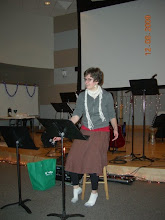Alright--at last! I was saying that my intent on Friday was a quick post about resiliency theory, and here is what I've got, via a presentation by one of my fellow ed students and the comments of my professor, Debbie Dougan. Actually, most of it is based off what Debbie said.
There are three factors which contribute to the ability of a child to be resilient despite adverse circumstances.
1) High expectations: don't dumb it down. Expect great things from them; don't make excuses for them or let their lame excuses slide. Believe that they are capable. Obviously there are cases in which excuses apply, but consider the experiences of Erin Gruwell, the teacher who began the Freedom Writers Institute and upon whose life the movie Freedom Writers is based. She says somewhere in the movie "Don't you think they know you're dumbing it done for them?" or something like that. She refuses to present her class with low-level Shakespeare and instead presents them with brand new novels. (These comments are actually based on a presentation by another classmate, which was done on the Freedom Writers, so I could have a few facts off, but you get my point.)
2) Opportunities to participate in meaningful activities: let them know they're worth it. Take kids to museums, libraries, theatres, let them know they are worth it. There are way too many things that kids at increased risk for adverse circumstances (e.g. students in low-income schools) miss out on. Do art projects, introduce the world as if it were attainable, encourage them to work hard in order to attain it.
3) A relationship with a caring adult: I believe she said that this is the factor which is most commonly found to be related to resiliency in overcoming adversity by children in adverse circumstances, and she definitely said that most often that adult is a teacher. Yes, believe it--teachers are so influential and so important. But, hey, if you're not a teacher, don't stop there. I imagine that the reason that person is usually a teacher is that teachers are the adults to whom we are most exposed during our childhood, besides family. But think about mentoring. You can get involved in a mentoring program through places like the YMCA and probably social services and whatnot. Debbie used to be a social worker, and she says that there are never enough mentors to fill the need for them. A teacher can only deal with so much, but imagine mentoring just one or two children in need of high expectations and opportunities to participate in meaningful activities--in need of a chance to see that they matter. Anyone can do that. So think about it.
Yeah, "brief"--I lied. I am rarely brief, even when I try. But fare thee well to all, and to all a good night.
Subscribe to:
Post Comments (Atom)

2 comments:
Sounds like youth ministry and Experiential Education all roled into one. I've heard all this in my youth ministry classes. Freedom writers was a text book. The book is much better than than the film. I need to buy it again. Adults and expectations are youth min. Meaningful and relevant experiences would be Ex Ed. This is fantabulous. Love you
Hey, tell me how much the book costs from the Simpson bookstore--if it's cheap, I want it:)
Lovelovelove!
Post a Comment